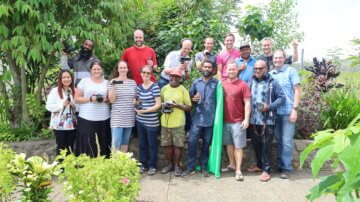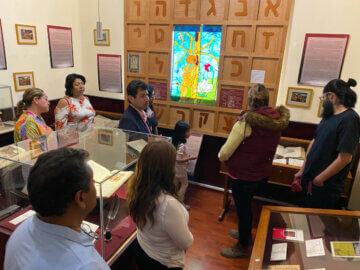Bible Translation and the Church
The global church is not only an agent for Bible translation. In the larger picture, the church is the goal of Bible translation. We spoke about this with Hannu Sorsamo, director of Wycliffe Finland.

Hannu Sorsamo
Could you talk about some of the ways you have been thinking about the role of the church in Bible translation? Both within Wycliffe Finland and with colleagues in the Alliance?
There has been quite a shift globally. When the Wycliffe movement became the Alliance, it included not just Western organisations but perhaps more significantly church denominations from the global South, who can have a very different perspective on the church’s role in Bible translation.
I think there’s been a big change in seeing the church as an agent of Bible translation. If you look at the Alliance’s Bible Translation Philosophy document, that’s verbalised quite clearly — the church’s central role as the agent of Bible translation. However, for us it’s really puzzling still, how we haven’t really seen much of the church being presented or seen as the goal of Bible translation. So I think that’s the other side of it. There’s a lot of emphasis on the church now taking responsibility for translating, but perhaps not so much obvious emphasis on the church being the aim, the goal, of Bible translation itself — why we translate.
What do you think accounts for that gap?
I’m still not sure. I’ve had various conversations about how we as Bible translation organisations are connected with the activity of translation and other activities as well. And then as a result, the translated Scriptures are produced. And then the usual narrative goes that the Holy Spirit takes these translated Scriptures and turns them into transformed individuals and communities and nations.
I obviously have nothing against including the Holy Spirit in our theology and strategy. But from a purely pragmatic perspective, it seems that there’s a really wide gap between the product of the translated Scriptures and the impact. Collectively, even as the Wycliffe Global Alliance, it seems that we don’t have much to say about what comes between the product and the impact.
So this is my big question. I see the shift, where the church is seen very much as the central agent of Bible translation, but not yet so much as a goal.
Would you say this might reflect a very individualistic thinking about faith?
I think individualism is part of it. This is a really broad generalisation, but I think overall Western missions, including Bible translation agencies, have had a narrative that has been heavily influenced by our individualistic culture.
At Wycliffe Finland, we often participate in conferences and events of our partners during the summer. Three or four years ago we had an activity. I think about 2,000 people participated. We asked them a simple question: “Why is it worth translating the Scriptures?” There were four options, and colourful balls that they could drop into a tube to give their vote. The two top options were: “So that individuals can become Christians”; and “So that a mother tongue church can grow.” And then there were two other options: “To preserve the language and culture”, and “To hasten the return of Christ”.
The top vote was obviously the individuals coming to faith, and then a tiny proportion of the vote was people who thought it’s the growth of the mother tongue church that is important. The whole narrative we’ve told, the marketing phrases we’ve used for decades is: “As the Scriptures are translated, people then read them and discover God’s truth and become Christians.” It’s basically the way we have told the story.
So, the message that Bible translation leads to personal life transformation.
That’s right. It’s often been told from a very individualistic perspective. And then we discover the reality that in many cultures where we have participated in Bible translation, people never read anything on their own, alone. Not the Bible, but not anything else, either. If people ever read anything, they read in community. And if there is any impact through the Scriptures, it is through the churches that use the Scriptures. That’s the vehicle of the Gospel spreading in community.
But we (in the West) are not so used to telling those stories. We come from a more individualistic culture, but also a very literary culture. We are surrounded by books. From a very young age, we are so used to reading stuff, and reading on our own. And we come from the Reformation tradition. The whole point of translating the Scriptures into the language of the people was so that you were not under the church’s authority anymore. You could study the word of God on your own and draw your own conclusions. “Do your own research”, as people say on social media these days.
That hasn’t gone so well lately.
No. But that’s part of our history. That’s part of our Reformation history. We have assumed that the same story works globally, everywhere. That’s the sales pitch we have used to tell our story to the public.
Realising this, what is Wycliffe Finland doing to move things in a different direction?
That’s a good question. How to put that into practice? Thinking about the church’s role in Bible translation has various different aspects that we have wrestled with in the last few years. I think we’ve made quite a bit of progress in our relationship with the church here in Finland — the way we view church as the agent of sending and how we view our own role. But I don’t think we’ve actually made that much practical headway in the question of how that should affect our partnerships and our sending, as we consider where we send people and what we send them to do. I think we are still facing that question.
I would like to tell you that we no longer send people to Bible translation projects where the project is not planned and implemented in a way that supports the emergence and growth of the church. I would like to say that, and I think we might one day actually write this down somewhere. But we currently don’t have the capacity to actually have these conversations.
Why?
It’s a very delicate issue. And it’s a balancing act in a way. On the one hand, we are saying we don’t want to push our own agenda. We want to listen to our partners. We don’t want to go with our own assumptions and then tell our partners what they should be doing. But then on the other hand, I think we feel very strongly about the role of the church and we would like to see our people serving in positions in projects which matter eventually.
You are well aware of the whole issue of unused translations, or what I call box translations. We are not particularly keen on sending people to do translation simply for the sake of having the book. But actually having that sort of relationship with our partners and that level of conversation where we can truly participate in discussing this — that is something we are now investing in, but we are not yet there.
How do you view technology’s role in all of this? Does the ability to look each other in the eye online make a difference in advancing this kind of thinking?
It possibly does. I think it’s a good tool. It’s enabling us to have more frequent conversations with our partners without travelling, so that’s a big thing. But I don’t think technology alone resolves the issue. It takes investment in time and in personnel. I’m actually a bit pessimistic about beginning to develop a relationship over Zoom — the assumption that once we have lots of Zoom calls, we share the same vision and we are on the same page and we can openly discuss things. I still believe in face-to-face, getting to know people in their own environment.
In the last two weeks I’ve done maybe 15 job interviews with applicants to our Mission Coordinator’s post. We are practically investing and that, hoping to find a person who could have that sort of capacity to have cross-cultural conversations and develop cross-cultural partnerships in a better way than we have been able to previously.
Tell me a little about the presentation you did at the People Forum in January. Was there a main point or two that you wanted to leave with the audience?
It was about the church, but more about our relationship with the church here. At Wycliffe Finland, we no longer want to see the church as a resource provider for our work. But rather, we would like to see ourselves serving the church, both in building the vision of the church and also sending the people for the church.
Sometimes we get tied up in the semantics. It’s very fashionable now to say, “We don’t send people. We help the churches to send people.” Well, yes, that might express some of the desire we have, but I think in practical terms, we do still send people. So I’m not avoiding that phrase. But the point is, we don’t send people regardless of the church. We send people on behalf of the church.
Let me give you a practical example in the way we have changed our membership process. The home church, together with the applicant, enters our membership process. So we don’t start the membership process with anyone unless their home church comes with them. We don’t send them and we don’t take them into the application process — because if we did, then what we would actually be saying is that the whole point is just to get these people sent. Instead, we are now saying that our mission is not to send people. Our mission is to strengthen the participation of churches and Christian communities in Bible translation.
As I’ve shared this with some of my colleagues, sometimes the response has been, “Well that’s all very good, until you have that brilliant person or couple who don’t have a home church. So what do you do then?” Well, my answer is, we encourage them to find a church. Get involved in the church and grow in the church. Talk about their interest in their vision with the church and then come back to us after a few years.
So that’s one of the practical implementations of it. We are not measuring our success by how many people we manage to send. We are measuring our success by how much we build up the church in their participation.
This process might look very different from what some of your longtime members experienced in years past, right?
In the case of some of our current members, they simply think their home church is not really involved in what they are doing. Because they joined as individuals. And their home church is there maybe to provide financial support through their budget process. But this is a whole different mindset. When they joined 10 or 15 years ago, that was not the approach of Wycliffe. We didn’t ask about their home church. It was simply, “Do you have enough support?” So I think it’s just a whole different mindset, to start the whole process by having a conversation with the church leadership.
As you speak with your counterparts in other organisations, whether in Europe or around the world, do you find that they are with you on this?
It’s hard to say. But I think what I can say is that the people I have discussed this with — and I’m talking about European Wycliffe organisations — there are some who would completely agree with this and they would do pretty much the same thing. Others would say this is really good in principle, but what do you do in practice? You have these great people you want to send and they don’t really quite fill this church criteria? Well, we don’t really think of it as a criteria. We think of it as a whole approach to the whole sending thing. We are not in the business of sending individuals without the strength and participation of the churches.
Might that also mean helping churches see mission as a collective movement?
There’s quite a bit of this emerging paradigm or whatever it is – “everyone, everywhere”. I’m not criticising it. There’s a lot of good in it. But this idea that everyone is a missionary and you can go and work abroad and be a missionary and follow your dreams, doing this here for a while and that there for a while. And that might not really leave much room for this sort of collective discernment of the church in sending people. It’s more shorter-term, ad hoc, kind of following your vision.
This might sound very negative. I’m not this negative about it. There’s a lot of good in it. But it doesn’t necessarily combine well with thinking of the church as the primary agent of mission.
You have also talked about church engagement as not necessarily meaning that churches engage with Wycliffe, right?
We try to build a shared vision of mission and Bible translation with churches. We are not doing that only as a tool to get these churches to participate through our organisation. We see that as a goal in itself. And then if they participate through someone else — Finnish Bible Society or one of the other Bible translation organisations — we have done our part. We have been successful, because that was part of our mission. But if it was only a tool for us to get these churches engaged through us, then we would have failed if they went through another organisation. So that’s the other change in our stated mission and the practical implementation.
So, it’s broader kingdom thinking versus single-organisation thinking?
We used to see ourselves as the bottleneck for Finnish participation in Bible translation. That was our self-assessment five years ago as we worked on our strategy and looked at our history. We realised that had been our identity. We were there to control who gets to participate. We were the gateway. We controlled who could be sent. But then we started thinking outside of this and seeing, well, it doesn’t actually matter where the participation is channelled. It can be us. We provide a platform for that. But it doesn’t have to be.
I am interested in two responses to that. One would be the response of the church. Are you getting enthusiastic buy-in? And then also from people within your organisation. Has this been a difficult shift?
I think it’s been mixed within our organisation. Some of our members are very supportive. But we have also had the response from certain members saying, “Well, if you had had this approach when we applied for membership, we would never have gone.” Obviously that’s a very tough one to respond to, because it can sound very cold to say, “That’s right. You wouldn’t have.” So you don’t quite want to say that. But I think the reason people say that is they don’t necessarily see their home church as having been so engaged that they would have supported them at that point. Our role then would have been to build a relationship with that church and have that conversation. We obviously don’t know what the outcome would have been. But yes, people do have reservations about this.
As for the response from churches, and that includes our partner organisations here in Finland that are denominational mission agencies: It has been very, very positive over the last five years or so. Not so much that we would explicitly share this philosophy, but we try to live it out. We have gotten feedback from various people who say, “It’s good to work with you because you’re not pushing your own agenda. You aren’t trying to sell us something. It looks like you really care about the vision.” I think this has been overwhelmingly the general response.
That’s interesting. I wonder if many churches still almost expect that sort of approach — that a mission organisation is selling something and the church’s role is basically to give money.
That’s right, and I think sometimes it takes quite a bit of effort to get over that expectation. We are not nearly where we would like to be in terms of being able to invest that sort of time in building these relationships, but I think that’s what it takes. It’s not just one visit and then there’s a change in perspective. It takes time.
Interview: Jim Killam, Wycliffe Global Alliance
Alliance organisations may download and use the images from this article.
The latest
View all articles
Informing, teaching, inspiring: PNG workshop teaches video storytelling for language communities
PNG workshop teaches video storytelling for language communities
Read more
Looking ahead at 2024
As the year unfolds, we marvel at the work of God in our rapidly changing world. And, we look forward to a number of gatherings and conversations intended to draw us together.
Read more
Telling the Bible's Story
It may come as a surprise that a museum is among the Wycliffe Global Alliance organisations.
Read more